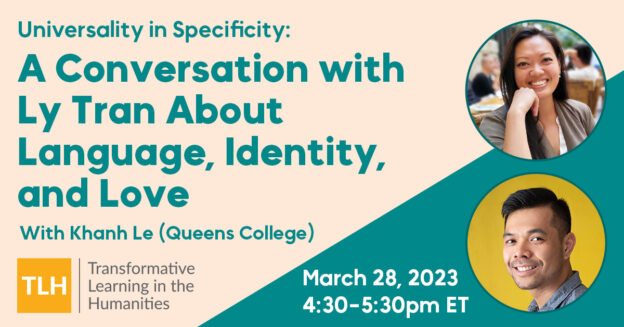On March 28th, 2023 TLH welcomed author of House of Sticks Ly Tran for an interview and interactive workshop, facilitated by TLH Pedagogy Co-Leader for Spring 2023 Dr. Khanh Le. Associate Director of TLH Dr. Christina Katopodis welcomed the pair and introduced the rest of the team.
Ly introduced herself, and shared some of her Vietnamese refugee family history and memories of performing sweatshop labor upon arrival in the U.S. as a child. She then read a brief excerpt from her memoir House of Sticks. Khanh thanked Ly and shared he relates as they share a similar background of Vietnamese refugee history. He emphasized the importance of centering the lived experience of Vietnamese refugees, instead of letting U.S. institutions remember the war and shape the narrative.
Then two members of the TLH Student Advisory Board asked Ly questions. Capellan asked, “How have your experiences and your relationship to water influenced your literary journey?”
Ly shared that she uses water as a narrative device; her family escaped Vietnam by boat and got caught in a whirlpool when she was an infant. Thus water can be a source of destruction, traversing, but also a source of life because we’re made of it and need it. She wants her words to be a source of healing, unity, and enlightenment, this is what she sees is her duty as a writer.
Javid asked, “How can CUNY bring people together like water does within your family? And by water we mean the healing and unity it brings within your family.” Ly explained we’re all rivers moving toward the ocean of humanity, and we can get polluted with trauma and oppressive stereotypes. By centering unity and equity, CUNY can increase the chances of meeting together, and doing the work of healing and connecting.
Khanh then asked Ly a series of questions about her writing. One question he asked was, “How did you balance the dichotomy of light and dark on the page, when you cover a range of heavy themes in your memoir along with moments of levity?” Ly shared this required a deep excavation of her past experiences and identity, and only after that was she able to add in brevity and moments of her and her family’s humanity. Khanh shared he relates to this, as he finds laughter and beautiful memories in trauma. The two also connected on translanguaging, transtrauma, and transmethodology, which are methodologies Khanh employs in his scholarly research.
Ly introduced an activity for the participants, inviting everyone to take 5 minutes, choose a complex emotion from the outer circle of the Feelings Wheel and write a scene in their life that centers that emotion. Afterwards many shared their writing, and Ly complimented the specificity and excavation revealed by participants.
Ly then engaged the group in a second activity, where everyone wrote about a moment in their life when they didn’t honor their truth, and how they discovered what their truth was. Many shared their experiences vocally and in the chat.
Khanh then asked who Ly writes for, and she responded that she looked for herself in books as a child and didn’t find herself, and that was a lonely experience. Thus, she writes for anyone who feels they’re alone or losing hope, and she also writes for her younger self, to validate her experiences, and hopes others will see their humanity reflected in her words. Khanh shared that he advocates for professors to center student experience in teaching so they can see themselves in the work. Ly thanked Khanh for his work of transforming pain through writing.
The floor was then open to audience Q&A in which Ly expanded on her experiences writing, and we wrapped up by Christina thanking Ly for her vulnerability and teaching tools, and thanking Khanh and the participants for their openness as well.


